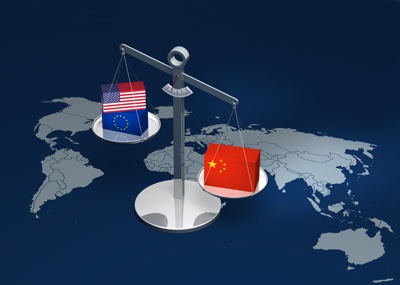
Chasing one’s tail
There’s a lot less drama to start the week but still plenty of possible noisemakers in play to keep things interesting. Global trade war tensions are on the rise again so on the heels of the latest US administrations salvo of metal import tariffs, the market’s focus will be directed at trade war targets, especially CAN MXN and EUR currencies. And of course, US-China trade tensions are but a spark away from reigniting once again.
Tariffs imposed by the US created a blustery G7 finance ministers meeting in Whistler over the weekend with the French finance minister saying that there were just a “few days” left to avoid a trade war. But friend or foe, the US administration is back on the mission to rebalance trade deficits and relations alike.
The US dollar could continue to benefit from a mild repricing in Fed rate hike expectations thanks to strong US employment and ISM data. The market is pricing in just over two hikes +(~2.3) for the rest of 2018 vs 1.5 before the data as we enter the Federal Reserve Board members ” blackout period” ahead of next week June 13 rate hike decision. But G10 currencies will be dotted with more PMI and trade data to digest. Global PMI’s have been softening a touch (from high-levels mind you), so traders will be keenly focused on the Eurozone prints as an uptick could provide a bit of tailwind for the EUR.
Italy is stabilising, and with panic hedges all but wholly unwound and rates positioning in the US market much more balanced, traders will likely need some convincing to re-engage after an exhaustingly tricky week in the trading pit. Even more so given the markets usually unpredictable nature before the Federal Reserve Board meeting circus rolls into town.
It’s always funny how things evolve in FX trading; it certainly looks like we did little more than chase our tail last but closing prices, in this case, paint an incomplete picture.
Regardless, the EUR sits here at 1.1665-75 on top of where it closed the Friday prior. And many other currencies are in the same boat mostly unchanged on the week. The overall market risk is much lighter in FX now, as we try and gain further clarity on the significant issues like trade wars, NK progress, EU inflation bounce, and the continued robust US economic data.
Oil Market
The bulls are starting to wave the white flag as this high-level of uncertainty around supplies going into the June 22 Vienna OPEC summit has kept the oil complex trading defensively. All discussion is centring on if Saudi Arabia and other OPEC members will turn the supply taps up. The market is nervous and thinking OPEC response will be to add more barrels which could intensify the short-term cycle of speculative long liquidation.
But still, OPEC’s response may be very conditional on prices heading into the summit so, despite the recent sharp sell-off, this notion could help keep a floor under oil prices ahead of the crucial meeting.
Energy ministers from Saudi Arabia, United Arab Emirates and Kuwait met on Saturday to discuss OPEC circumstance. “They called for sustaining the current partnership to continuously adapt to ongoing market dynamics, in pursuit of the interests of consumers and producers while promoting healthy global economic growth.” The focus on consumer interest suggests that OPEC members want to stay on President Trump’s right side after he suggested the cartel is keeping oil prices artificially high. But if OPEC starts increasing production, this is when compliance will be dearly tested as you may see everyone look to ramp up simultaneously. But in the absence of any definitive statement, the markets will continue to debate the June meetings outcome which could increase volatility in the weeks ahead.
US rig counts rose again the week ending Jun 1, but the modest increase will not be a significant driver.
Gold Market
Gold prices are trading lower as trader move to reprice US interest rates higher after solid NFP and SIM data which buoyed the US dollar. Gold prices could come under near-term pressure as the Fed remains on track to raise US interest rates next week. It’s very common for gold to trade defensive ahead of a Fed rate hike, but with geopolitical risk premium deflating, these narratives should provide a challenge to golds ambitions this week. The markets will be reluctant, in the absence of geopolitical escalation, to add more topside risk until they get a better read on the Fed forward guidance. Keep in mind the latest run of US economic data has been very solid and has supported the US dollar. And since Gold has been little more than a US dollar trade of late, the stronger USD will continue to provide the most significant near-term headwinds.
Asia Market
Asia markets direction is very much undetermined and remains jaded by trade tensions, but in general, volumes have remained very light and could even dry up further with Summer upon us and a busy World Cup schedule that should keep both local traders and investors glued to their television day and night. While support remains intact, there are few catalysts to trigger a significant bounce higher for regional sentiment.
In Hong Kong markets will come under the glare today following the large rebalances in the MSCI and Hang Seng indices which saw the inclusion of A-shares into the MSCI index.
But in general, local market should remain guarded ahead of a range of Chinese Macro data with the Caixin PMI, FX reserves, trade figures, PPI, CPI due out this week. Markets in Indonesia will re-open following holidays, and PMI figures will be out in Malaysia and Indonesia.
A statement released by Chinese trade officials is making the rounds this morning. While a bit vague and lacking in specifics, the general take way is that of tit for tat. “If the US launches trade sanction measures, including the imposition of tariffs, then all the economic and trade benefits negotiated by both sides are not going to take effect.”
Malaysia Market
After the recent round of policy statements, there is greater clarity on what Malaysia growth driver will be. Much lower public spending is a definite but the negative economic impact should be offset by strong internal and external drivers explicitly relating to private consumption and trade. But given that inflation is running at a tepid pace BNM will hold interest rates level through 2018 on moderating core inflation. However, fiscal deficit expectation will be the wild card. But so far market expectations are not sounding any alarm bells and its expected even the worst case deficit scenarios are not sufficient to signal a rating downgrade.
But with BNM likely to sit idle through 2018 and uncertainty over the fiscal outlook, I’m shifting gears from neutral – slightly bullish Ringgit to neutral over the near term as the currency remains in the dreaded do not trade zone.
As far as domestic markets are concerned, it looks like we’re going to have another repeat of the past few weeks with foreign interest sidelined until cleared signals develop.
MYR: Holding pattern suggesting current ranges remain intact.
Currencies
EUR: With calm engulfing Eurozone markets, the Euro could find some relief over the short term but indeed the wear and tear from election crisis, and the waves of populism gripping Europe do point to some longer-term structural issues for the single currency. None the less, short date trends will continue to be driven by near-term growth sentiment. So with the Eurozone inflation spiked towards ECB targets in May. And while policy markets disregard oil price shocks, if this inflation data will support a hawkish case to reduce bond buys over coming months, which should cause the EURUSD to base. Not to suggest Euro bears beware, but worth keeping a lookout.
JPY: Risk trade and US bond yields are driving sentiment.
AUD: The Australian dollar remained entirely off the radar and given just how uninteresting domestic developments are ranges should remain very much intact.

